How To Keep Chickens Warm In Winter Without Electricity
If you are looking for help on keeping your chickens safe in the winter, this list of tips for how to keep chickens warm in the winter without electricity is a great place to start.
Raising chickens in the winter is easy when you know how a chicken keeps warm. And the warmer the chicken the more eggs you will get even when it’s really cold out!
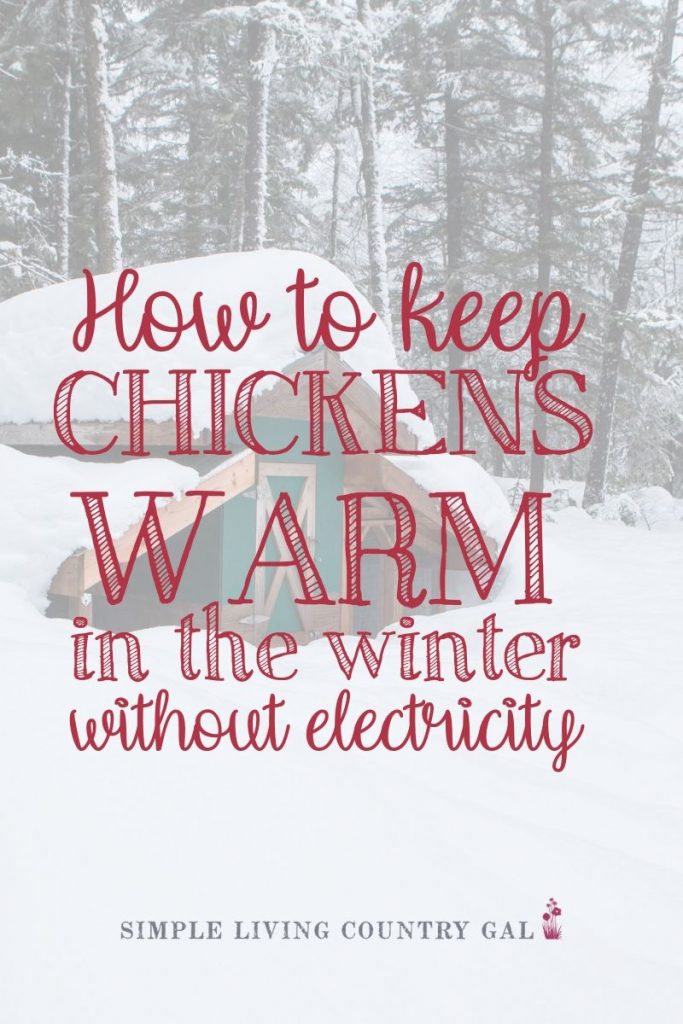
When you look at a chicken, the words hardy and durable may not be what comes to mind. And for that reason, we tend to go a bit overboard when it comes to their care. Even if you live in the blistering cold of the north, keeping chickens is pretty easy.
More often than not, chickens can tolerate the cold pretty well, but with a few tips, I can show you how to keep chickens warm in winter without electricity.
Should you use heat lamps in a coop?
Heat lamps are a big buzzword for the new chicken owner, and most will purchase several when starting out. Other than using them to keep your baby chicks warm, I would refrain from using them in an established coop.
I tried heat lamps for the first few years we had chickens, and let me say it did more harm than good. When you have an artificially heated coop, your hens become dependent on that heat, which means they do not naturally develop the durability to withstand cold temperatures.
We do not use heat lamps in our chicken coop
Heat lamps are fire hazards. A few years ago, a devastating barn fire in our area was started with a single heat lamp. It was at that time I decided not to use any heat lamps in our coop the following winter and I noticed something pretty shocking.
My hens were actually HEALTHIER without the artificial heat. Their bodies adapted to the cold naturally by growing thicker downy feathers. That first year, instead of sick chickens with dull combs, I had chickens with fluffy thick feathers, combs that were a deep, rich red, and they laid eggs like nobody’s business.
This was proof I was on the right track.
What are downy feathers?
Downy feathers are soft feathers found under the tough outer feathers of a chicken. They help to lock their natural body heat in, providing a protective layer from the elements.
The chickens will fluff up their feathers to keep warm, and whenever you see this, you can relax, knowing they are doing exactly what they are supposed to do. If you are a person who puts chicken sweaters on your hens to help them keep warm, I would suggest you stop, as these sweaters can flatten down those downy feathers, and your chickens will lose that ability to warm up naturally.
Disclaimer: Do not make a change in the middle of winter. It is best to allow your hens to adapt to the cold naturally, which takes time. If you are reading this in December-March, you may want to hold off on these tips until next fall.
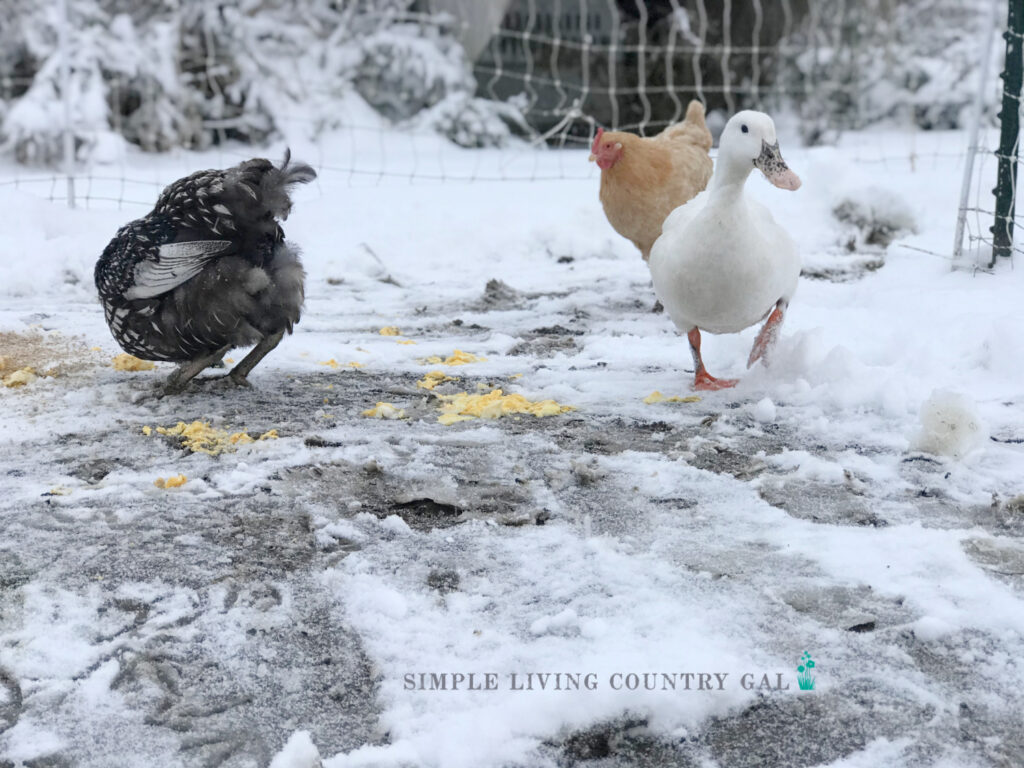
How To Keep Chickens Warm In Winter Without Electricity
There are other things you can do to help your hens stay warm even in the coldest of temperatures, even if you do not have electricity in your chicken coop.
Most, if not all, of these tips have been tested by me in our own winter coop. The good news is we have never lost a hen to the cold or even had one get sick. We have had 1-2 bouts of frostbite over the years, and because of that, I am super vigilant about checking my flock several times a day. Please watch your animals for signs they need your assistance, and you will have a healthy flock all winter.
READ: Caring for Chickens in the Winter
Inspect your chicken coop
If you clean out your chicken coop each fall before the winter hits, that is the perfect time to do a chicken coop inspection. Check for any holes in the walls or floors that may let in drafts, rain, or snow. Another reason to inspect for holes is to deter predators from accessing your coop, which can happen often in the winter.
READ: BACKYARD PREDATORS – HOW TO KEEP YOUR CHICKENS SAFE
Seal any cracks and help keep the frigid air out of the coop. You can do this by nailing on a scrap piece of wood over any openings you find.
AMERICAN WOOD FIBERS 532.67P2LGEAC 8 CUFT Large Flake Bedding




What is the DIFFERENCE between ventilation and drafts?
Yes, there is a difference between airflow (ventilation) and drafts. Drafts are cold and piercing and can harm your flock. Ventilation is filtered so it enters the coop slowly and steadily and keeps the coop filled with fresh, clean air while venting out stale air. Most air vents are high up in the coop, away from your hens, so it is not blowing on them.
The final work on this is: that you do not want drafts, but you do want ventilation.
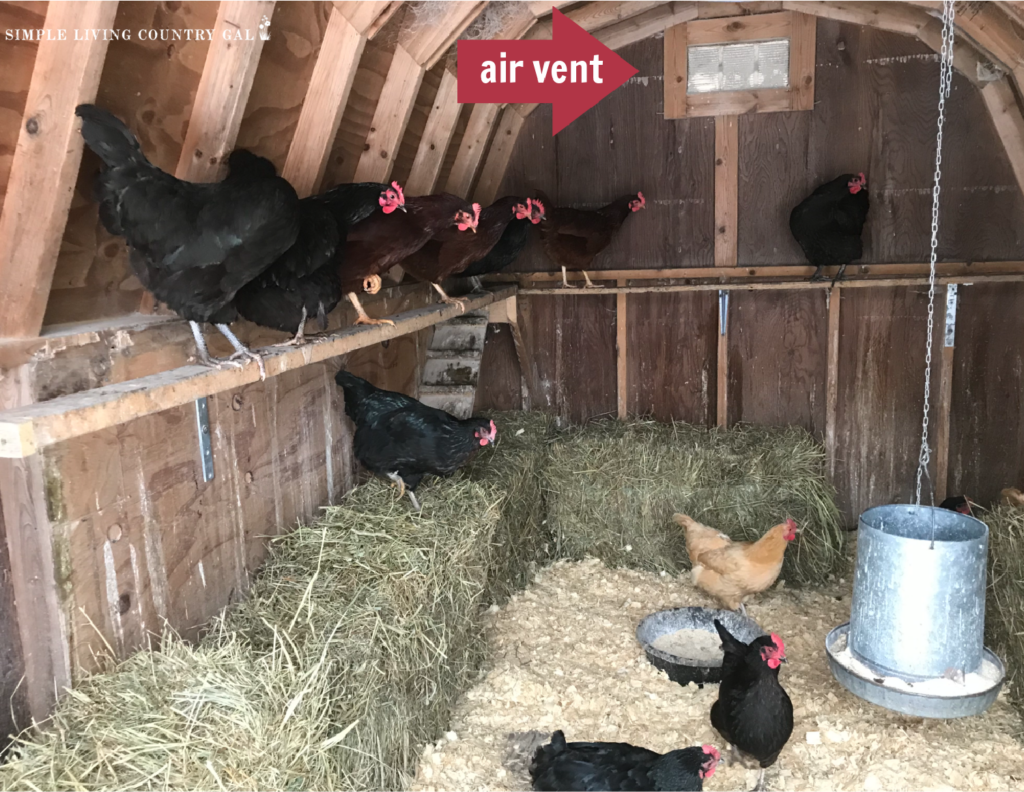
Lay down sufficient bedding
Before winter hits, you will want to lay down a good layer of bedding for your hens. Wood chips, sawdust, and straw are all great to use. If you are not sure what the difference between hay and straw is, you can read this post for tips.
Adding in bedding will give your chickens a barrier to walk on that is warmer and softer on their unprotected feet.
I suggest laying down a good foot deep of bedding, especially if you live in a really cold climate and even more if your chicken coop does not have a separate floor to the ground.
When looking to purchase wood chips, you will want to purchase them locally as it will be much more cost-effective. Tractor Supply or your local feed mill are great options to consider.
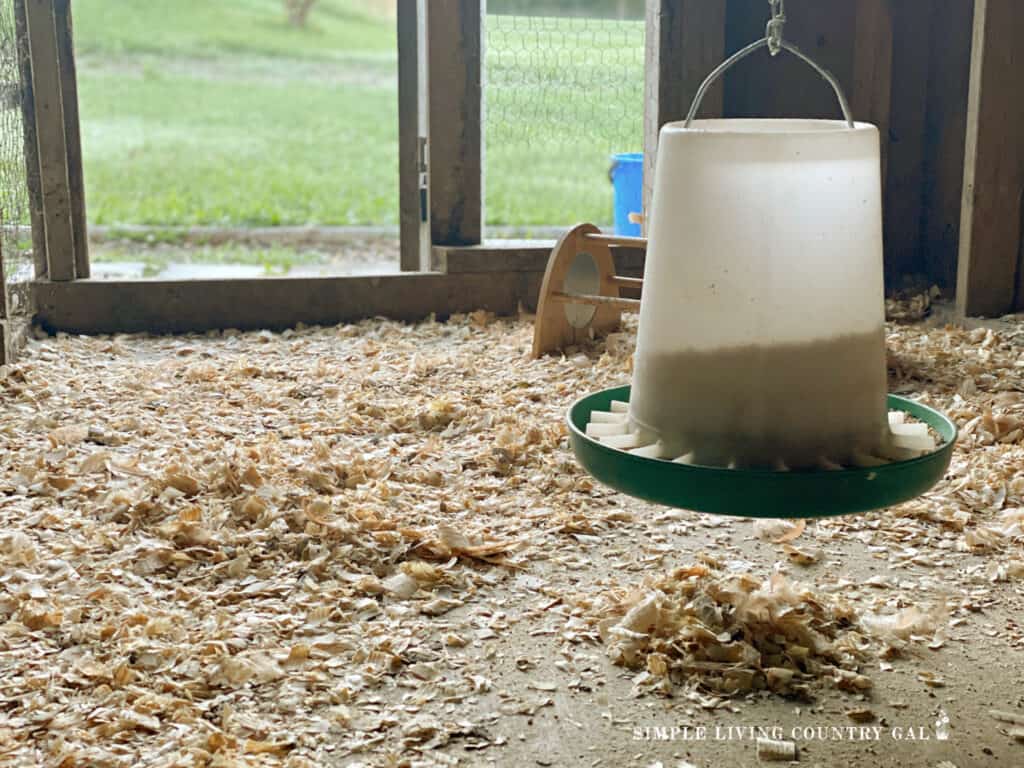
Why do you need bedding on the floor of a chicken coop?
Chickens do not have feathers on their legs or feet, so standing on the constant frigid ground can be not only cold but can risk frostbite. By providing them with a thick layer of dry ground cover, you will keep them warmer and, in turn, healthier.
SLCG PRO TIP: Chickens do not have feathers on their feet, and frostbite can happen if we are not careful. By providing them a place to stand in the cold, you will help to keep their feet healthy and strong. Ample bedding or a few straw bales will work well, along with a roost.
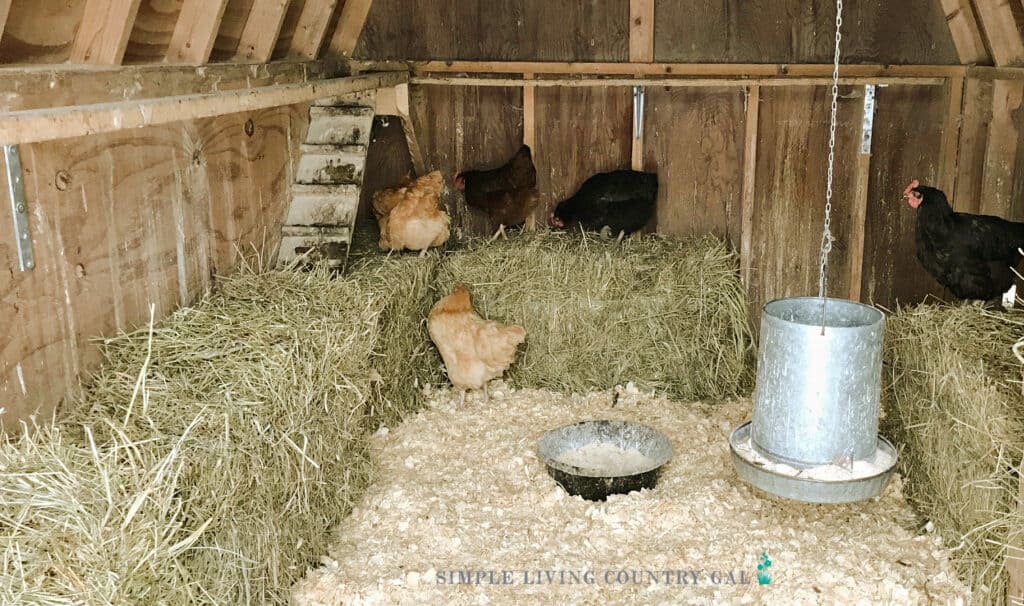
Set up a barrier along the walls.
We have very cold, strong winds during the winter, and this tip helps keep the interior of the coop warmer. I make a wall using bales of straw along the inside of the coop to help keep that cold wind from getting inside. This gives the chickens a nice cocoon and warms things up.
They also like to roost on the bales, and this will help them to stay off of the cold ground if your coop does not have a floor.
As the winter progresses, those bales tend to get a bit beat up but don’t worry. If you used straw and not hay, you can add those partially composted bales to your garden come spring.
Not sure of the difference? Let’s go over it quickly.
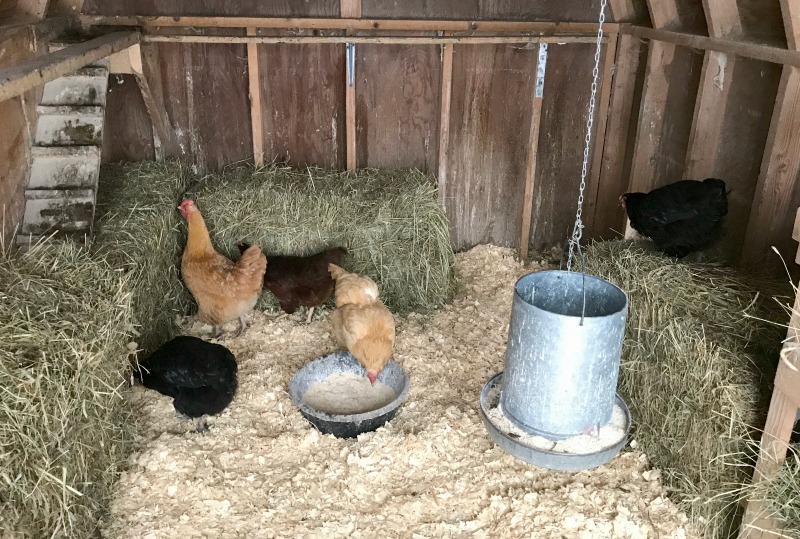
What is a straw bale?
A straw bale is made of up stalks which is the waste product of wheat and is used as bedding for livestock. It contains no seed heads or seeds, so it can be safely used in gardens as mulch or as a winter cover.
What is a hay bale?
A hay bale is cut grass or alfalfa and used to feed livestock. It contains every part of the plant, including the seeds. If you use this in your garden beds, you will be adding a load of seeds to your beds, including weed seeds. Trust me on this, I have done the legwork. Hay in a garden is a no-no and will only cause you to have to weed more than you ever imagined.
The final word to remember is this: Hay is for feeding and straw is for bedding.
Chicken Care Calendar

Do chickens lay eggs in winter?
Yes, chickens will lay eggs in the winter, but the frequency will slow. This is due to the shortened days and the cooler temperatures.
A few hens will stop laying eggs during the winter months, but many will slow down egg production. It is essential to know that eggs can freeze in the winter, so you will want to check for fresh eggs a few times a day so you do not lose any to the cold temperatures. If you do get frozen eggs, don’t throw them out, you can still use them to feed other livestock on your homestead.
Yes, you can feed eggs to your chickens. I know that may sound gruesome, but they are a great source of protein which can be super helpful at times of stress.
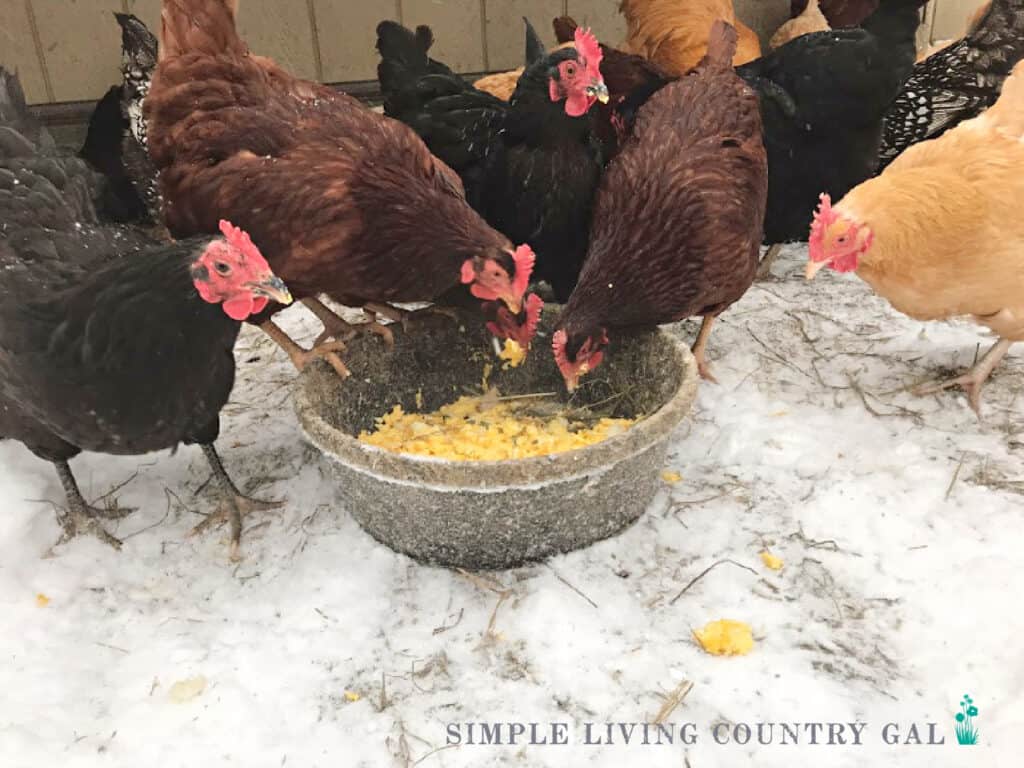
Help with frozen water.
When the mornings are really cold, my chicken’s water is usually frozen solid and needs to be broken up and removed. I like to give hot water in the morning and this helps the water to keep from freezing until I return for afternoon chores.
Please know that I do not recommend giving your chickens hot water to drink; be sure it is cooled off before you allow them to drink it.
SLCG PRO TIP: If you live in a cold climate, I would not suggest a chicken waterer like this one. They tend not to withstand the cold elements and the abuse repeated frozen water can cause. Instead, try these rubber feed/water bowls. They are durable, inexpensive, and can be used for feed, water, or even mash.
I know repeated water trips sound like a lot of work, but it actually isn’t. All you need is a cleaned-out empty milk jug, and each time you go out to the chicken coop, bring a fresh batch of warm along with you. If you are going out anyhow, it is really no extra effort on your part, and your hens will love you for it!
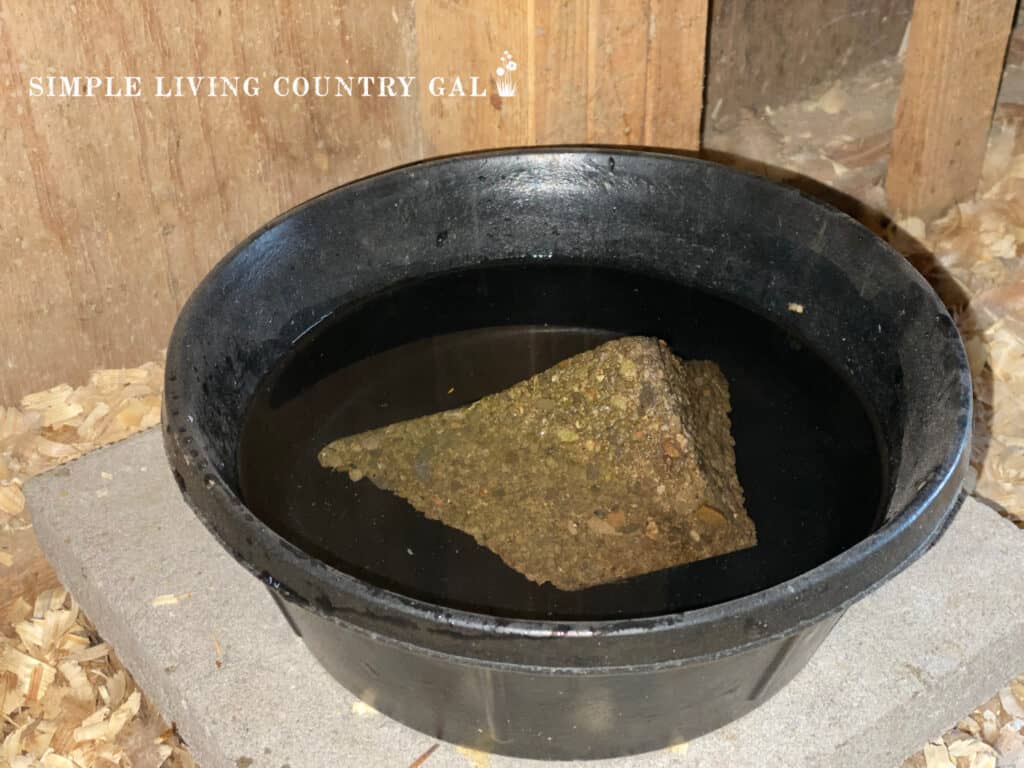
Another bonus of frequent daily water runs is you can monitor your flock more often and, in turn, catch anyone not adapting well to any weather changes. Knowing your birds and how they each act is incredibly beneficial because you will more readily see when they are not acting normally. If you know a bird acting “off”, this will be your first sign that something is wrong.
feed Warm Mash in the morning
I also like to give warm mash on those particularly cold mornings. This not only encourages my hens to eat but also gets more water into them as well.
To make a warm mash for your chickens, pour some hot water into a rubber feed bowl and add a scoop or two of leftover veggies or vegetable ends and peelings. You can also add oatmeal for the “mash” part. I love to use rubber feed bowls and use them all over the homestead. They work perfectly for making warm chicken mash and are super easy for the chickens to eat from.
The best part about warm mash is there is no need for mixing. The hens will do it as they are eating it. Usually, when I make mash for them, I find they are eating before I finish adding the feed to the water, they love it that much.
How to keep chickens warm at night.
The worry we have about our chickens staying warm throughout the night can bring us the most stress. Please remember as long as you allow your hens to acclimate to the cooler temperatures naturally. Then you will only need two things to keep your hens warm at night.
First, a chicken coop with little to no drafts is essential. As I talked about above, you will want to inspect things in the fall so you have time to button up the hatches before winter.
Second, you need a roost that allows for plenty of room for your entire flock to get up off the ground at night while they are sleeping. When we first started with chickens, I was under the impression that they needed a rod of sorts to roost on.
I believed that chickens wrapped their feet around a roost to sleep just like a bird does.
It wasn’t until years later I found out that is a common misconception. Hens prefer to be flat-footed when they sleep and even more so in the cold season. When they are sitting flat-footed, they can sit down completely, which will allow them to cover their unprotected legs and feet with those warm downy feathers.
What is a good size for a chicken roost?
A good rule of thumb is to build a roost that is at least 2 inches wide. This will allow your hens to perch flat-footed and cover their legs and feet with their warm feathers.
After many attempts at different styles of roosts, Hubby and I found a design that we love and is perfect for anyone that has a smaller coop and needs to conserve space.
READ: CHICKEN ROOSTS – EVERYTHING YOU NEED TO KNOW AND MORE!
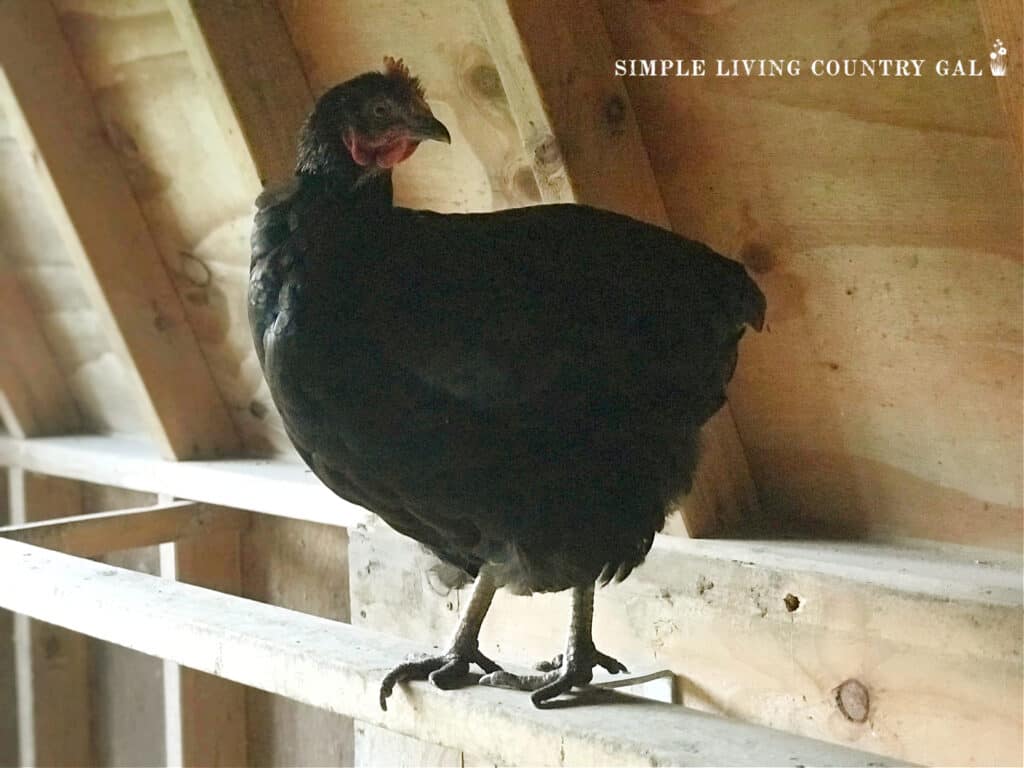
Offer continuous feed.
Just like goats, chickens warm up when they digest their food. For that reason, when looking to keep chickens warm in winter without electricity, it is better to have a continuous feeder going at all times. I have a metal feeder like this one, and it has lasted for years and works amazingly well.
Not sure about using a continuous feeder?
Lisa, from Fresh Eggs Daily, suggests using a continuous feeder all winter long to keep our chickens warm saying, “They will eat more in the winter because they burn more calories trying to stay warm and there’s no grass or bugs to eat to supplement their diet.”
You can also use a plastic feeder if you are on a tighter budget. These are less expensive and will work well but they may not last as long as a metal feeder will.
Sure, you are spending a bit more on feed doing things this way, but our job is to give the best care to our animals, and a healthy chicken is worth the money of the additional feed, especially if you want eggs all winter long.
You can also sprinkle a little chicken scratch before closing them up for the night. Scratch takes a bit longer to digest and will help to keep them warm while they sleep.
Rearrange the layout of the coop
We locate our nesting boxes in different areas depending on the season. For example, we prefer to have our boxes in the warmest part of the coop in the winter.
- Be sure your nesting boxes are in a warm area of the coop and stuff them full with warm bedding.
- If you cannot move your roost add in extra insulation along the nearby wall for added warmth.
- Keep water and feeders to the center of the coop where it tends to be warmer.
Keep chickens warm in the snow
No matter what the weather is doing, you may find your chickens still wanting to be outside. This means you will want to do a few things to ensure your hens are not at risk of frostbite on their feet.
The best way to help your chickens to deal with the cold of the snow is to create a covered walkway of sorts for them while they are outside. This can be done either by scattering wood chips or straw onto the ground, placing logs for them to perch on or sprinkling sawdust in a few areas.
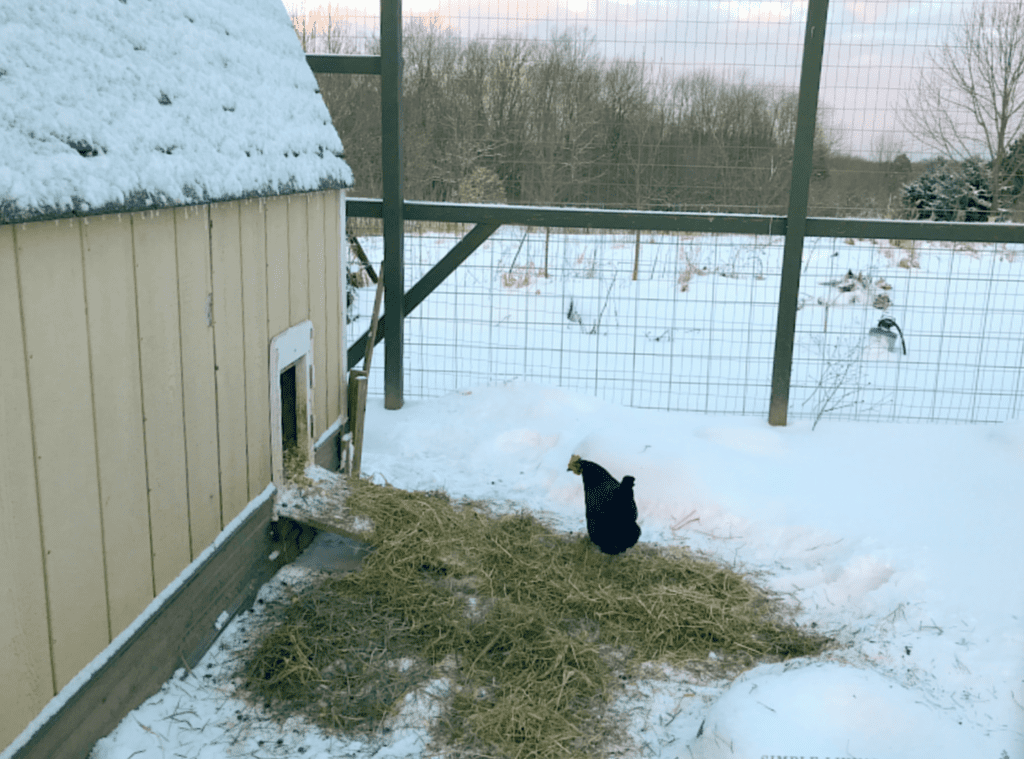
To set up a safe space outside for your chickens, begin by shoveling an area in your coop that is free of snow. Lay some straw or other material down on the ground for a safe place for them to walk on. If you find your hens staying at the door and not coming out, you can also sprinkle some scratch onto the straw to encourage them.
Why do you want your chickens and ducks to come outside in the winter?
Fresh air can be so good for hens as it will clean out their lungs. Also, a chicken coop, no matter how well it is kept, is still a dusty environment. By giving your chickens a safe place outdoors, you will allow them to stretch out and clean out their feathers.
Once your hens are used to a pathway outdoors, they will use it more and more. Getting your hens used to the winter weather will get them out of the coop and in the fresh air, which is huge for promoting overall good health and weather durability.
With that being said, if you have a chicken that is acting off, coughing, has loose stools, or is not eating/drinking, do not encourage them to go outside. Instead, take them to a warm area and do a health check to ensure they are okay.
How to keep eggs from freezing in the winter.
If you are new to raising chickens, this might just be a bit surprising to hear. Yes, eggs can and will freeze if it is cold enough outside. And a frozen egg is probably not an edible egg. To prevent this from happening, collect eggs several times throughout the day. You can also add extra straw to your nesting boxes to help keep the eggs warm until you collect them.
Can I eat a frozen egg?
Sometimes you can, and sometimes you can’t. I know, not what you were hoping to hear. No worries…let’s go over things a bit to clear it up.
- If the egg is frozen and not cracked, then you can place it in the refrigerator so it will thaw slowly. Once thawed, it should be fine to eat, but inspect it thoroughly for any cracks.
- If the egg is frozen and just cracked (meaning nothing is oozing out), then thaw it again in the fridge and be sure to use it right away. If you notice the membrane is dirty, you may want to be safe and toss it.
- If the egg is frozen, cracked, and oozing, then to be safe, I would toss it. If you have pigs, you can always give the eggs to them.
Finally, can chickens stay outside in the winter?
As long as you have a warm, secure, and dry coop for them to get away from the elements, then, by all means, yes, they can.
Chickens can be very hardy if given the chance to adapt to weather changes gradually.
Allow them to have continuous daily access to the outdoors year-round so they can adapt to any weather changes slowly. This will help hardy them up as well and acclimate them so they can withstand the frigid nights of winter. As the weather changes so will their feathers, and it’s those feathers that will help them the most.
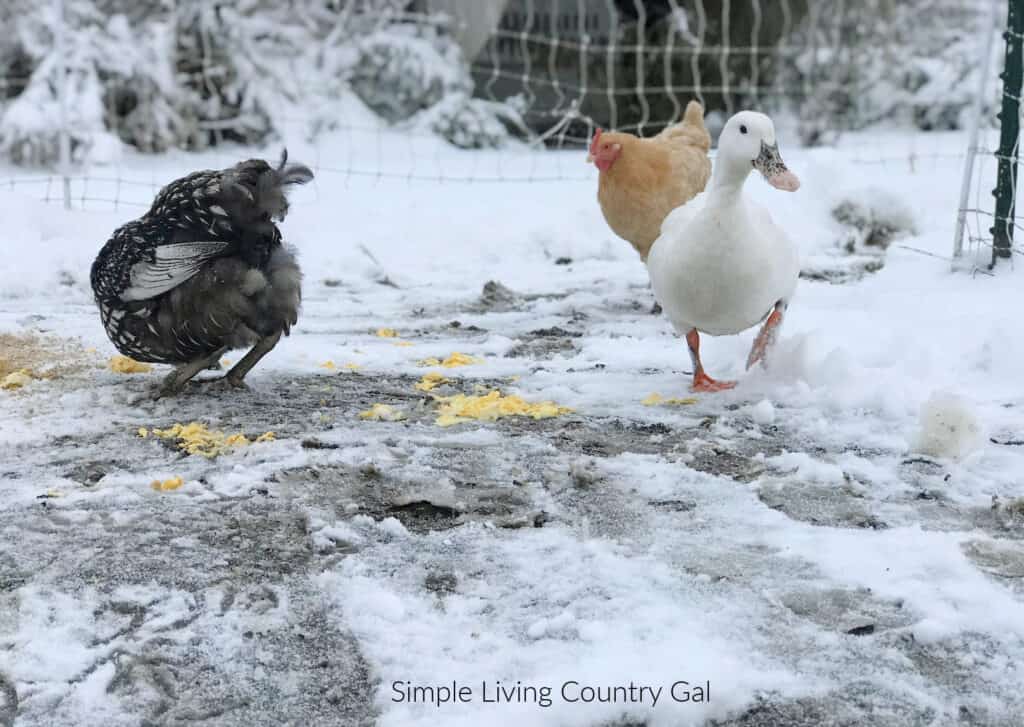
I hope you found the help you need to encourage your hens to better handle the colder temps. Be sure that you always check your flock every day so you can more quickly catch when things are off.
It’s those little cues that will help you to raise chickens that are healthy all year long. What tips do you have on how to keep chickens warm in winter without electricity?
More Chicken Care Resources:
- How to Keep Eggs from Freezing in the Winter
- How to Keep a Clean Chicken Coop
- Converting a Shed Into a Chicken Coop
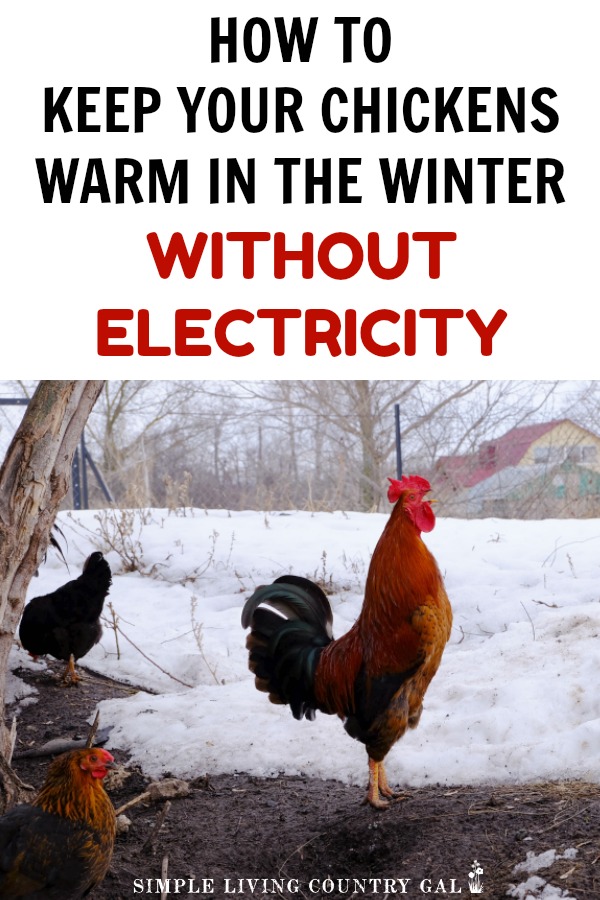

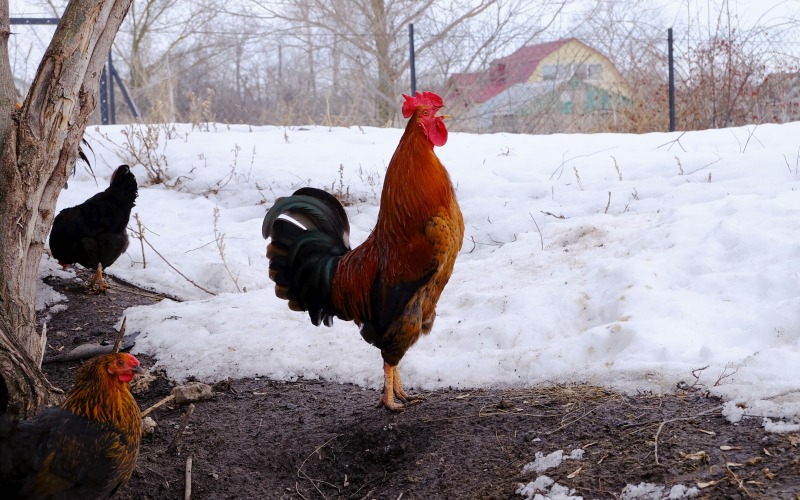
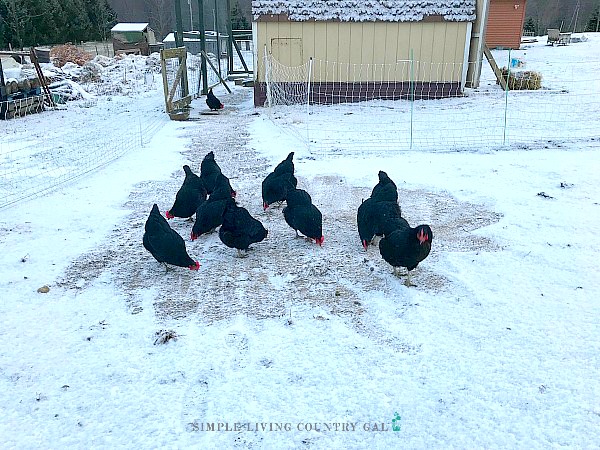









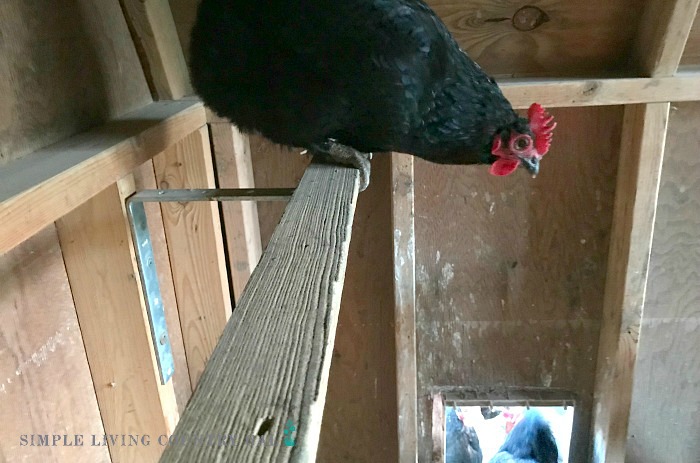
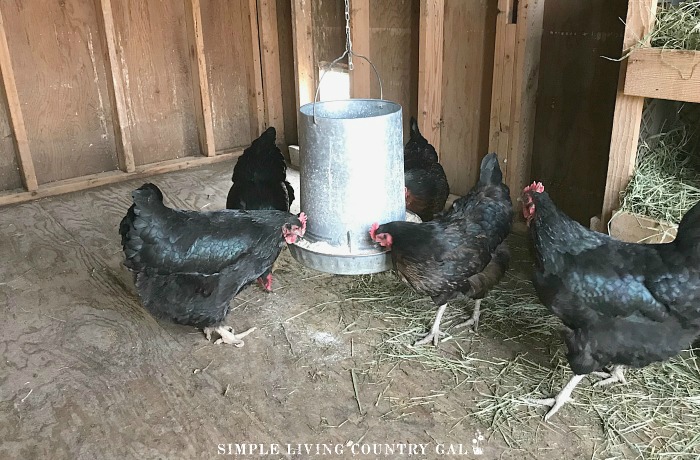
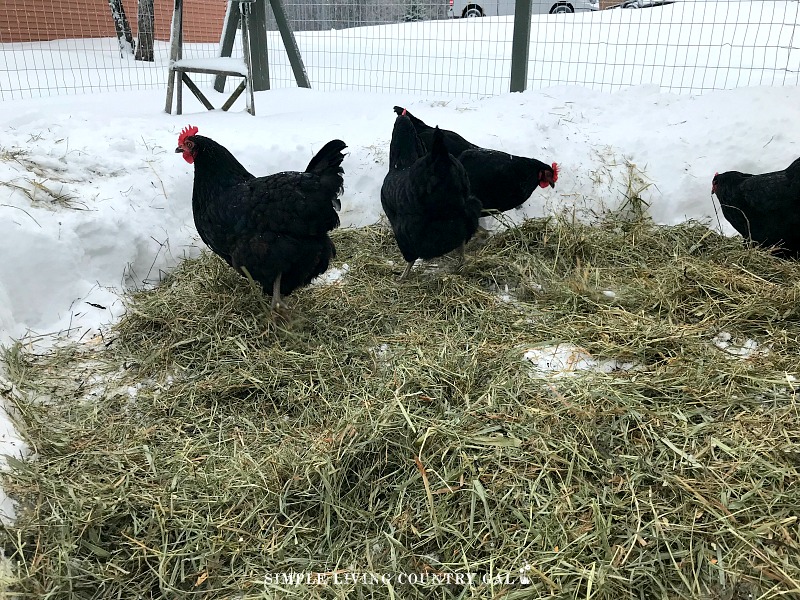
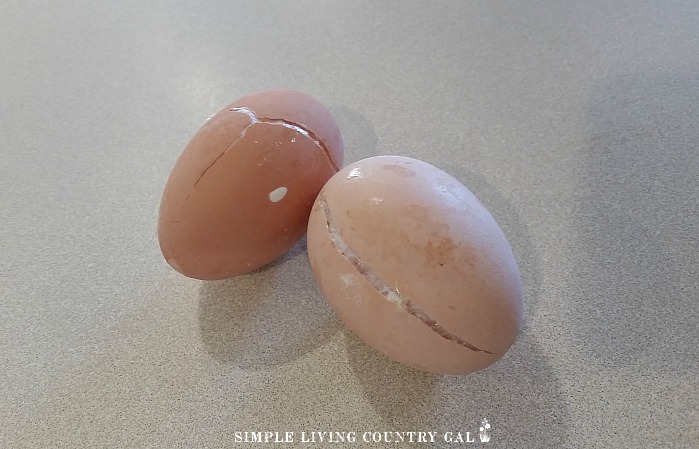
I enjoyed your article about chickens.
Thank you, Nancy!
All my chickens have for the whole year slept up a conifer tree in my garden, I’ve tried and tried to stop them bar cutting down the tree but they love it. How can I make sure they are warm enough.
Thank you
Hello, Jo!
If you live in an area where the weather gets quite cold you may want to teach your chickens to go into the coop where it is warmer and safer. To do this, purchase a favorite treat such as meal worms. You can then only give them those treats after they come inside of the coop. Call them in, sprinkle the worms on the ground, close them up for the night. This may take a few times before they learn where to go but eventually they will get the hint and learn to come in at night.
I hope this helps!
Tracy Lynn
Hi, We live in upper Michigan, it gets cold! We have had some trials with starting this last year! But to make a longer story short I now have 4 ducks, 6 guinea hens! So when I started We insulated a shed for chickens and ducks. Then later got guinea hens! I have a greenhouse that’s not insulated! It’s much bigger! We had to put the ducks and chickens in the greenhouse. It seemed crowded for them in the shed! We did put a middle level in the shed the hens and guineas. But the 2 didn’t seem to get along. Now I feel like the greenhouse isn’t fair to the ducks and chicks.. they do have ground floor so access to dirt, woodchips, for scratching!! Water warmer feed, and fed greens mid afternoon! I see they all are always by the door wanting out. Idk what to do. Am I doing smt wrong?? TIA
I forgot to ask also, my chickens love to eat snow. I was told that’s not good for them at all. It cools off there insides and they will die! Even just a little bit! I’m concerned! They have eaten snow since we stared getting it. There fine! But is it truly something I need to be worried about, and if so how to prevent them from eating the snow!!
Try not to worry!
Many birds in the wild eat snow in order to stay hydrated so, your chickens eating snow is instinctual for them. If you are concerned, you can give them more water sources but eating a bit here and there will not harm them.
Chickens prefer to be in a safe enclosed area at night as they do not see well in the dark, but during the daytime they prefer to be outside. Rain, shine, and yes even snow. So the fact that your birds want out during the day is totally normal.
The trick is to allow them to get in AND out during the daytime. Keep their food inside only so they know to go in in order to eat. This will encourage them to come in every now and then.
I hope this helps!
Tracy Lynn
Thank you so much for all of your great advice. This is my first year in upstate New York, raising laying hens. They will be so much happier and healthier now that I know how to keep them warm.
Great to hear, Nadine!
Good luck
Tracy Lynn
I love your idea about keeping bales in tact. I just removed a broken bale and all the straw in my coop, to keep mice from enjoying a condo. Do you have any suggestions for controlling mice?
I use good old spring-loaded mouse traps that we hide behind the bales. It’s true we get a few mice but not anything that is a risk to our flock.
Great read, thanks so much for sharing your knowledge. It will be my first winter having hens so this is really helpful.
Abby x
A recycled tire works well. The black warms in the sun. Gets them off the cold ground. They all sit around it in a chicken circle. Be sure drill large holes on the bottom side so water does not accumulate and breed bacteria and mosquitoes.
I just love this idea, Heather! Thank you for sharing!
Tracy Lynn
Thank you , good idea !
I enjoyed your article. Confirmed a lot of information my boyfriend and I previously disagreed on. Thanks again
They have a core temperature 107-108. They have a year round downy coat. They don’t need heat!
Thank you for this thorough list of tips! I live in Montana, where summers are scorching hot, and winters are brutally cold. This is my first attempt at raising chickens, and although they are for eggs, I want to make sure they are treated humanely. I have read that (proper) ventilation in the winter is one of the most important factors in a coop design, and am working on building one while my chicks are still in their brooder.
You sound like you will be an amazing chicken owner, lucky hens!
my coop has a window of chicken mesh in it, quite large. Do I need to close it off in winter? Ive seen a lot of coops don’t have mesh windows and are in darkness when closed. I don’t want them to freeze.
If you are worried about the dark, you can cover it with plexiglass. It is inexpensive clear plastic that will help to keep your coop a bit warmer.
I hope this helps,
Tracy
Drill small holes along the edges of the plexiglass and attach it to the chicken mesh with zip ties. Leave open at the top for coop ventilation. It’s easy to snip the zip ties off come summer, and store the plexiglass to reinstall next winter.
What a great idea!!!
Our window is covered in screen so nothing out or in Hubby built a plexi glass frame attached at top with hinges Can open in summer And closed in winter
Oh, I love this idea, Lynn!! Thank you for sharing!
Tracy Lynn
Thanks Tracy! This article was most helpful. Now I’m not afraid to keep my chickens through the winter. :). I live in Ontario , Canada so it can get a little chilly … especially at night. 😉 julie
Yay, Julie, so glad you found it helpful!
When it gets down into the teens and single digits, I will use Vaseline on their combs and wattles to keep them from getting frostbite, which is very painful. My chickens are not tamed and in order to apply the petroleum jelly, I do it while they are on the roost. I have my husband hold them while I apply the jelly.
I just have a few chickens and a small chicken coop ( I let mine free range ) In the winter I cover my coop with blankets & a tarp. I then add straw to the small run, but in the morning I let them out and they do their own thing. I have Bantam chickens and they have made it through the winter so far. This winter I will have some young chicken ( I have a mama hen on eggs now) is there anything I should do different?
Hello, Jennie!
The main thing to be concerned with is your chicken’s feet and wattles. Those two areas are the least protected. By putting down a patch or two of straw or hay you will give them a place to stand. Chickens do not always think to stay out of frozen water or snow but if you give them a warm dry spot even outside they will stand there instead.
I hope this helps!
Tracy Lynn
That heater you posted is not solar powered.
Would love to find one that is.
Any leads?
No, it is not. I do know there are quite a few options on Amazon. Have you checked there?
Hi very helpful information…. I live in Ontario, Canada, and expecting a brutal winter here. I have the solar powered heater and keep it at the corner of the coop by the waterer. I do have a heated one but still have to replenish constantly but it does last longer
I try to give them food throughout the day just to keep them warm, and busy as they do get bored. Also a suggestion I bought an old xylophone and hang it upright so they can peck at the coloured keys. they seem to like it lol. musical hens.
I just love that idea of the xylophone! So fun and helps with winter boredom.
Thanks for sharing!
Tracy Lynn
I LOVE the xylophone idea! That’s awesome!!
Thank you for a great idea. Chickens get bored, I hang cabbage and apples on twine for my chickens to play with. They love it. If you do this, make sure you hand them low so the chickens can reach them.
Love this!
This was one of the most thorough and helpful articles. Thank you!
Great article. You really know your chickens and have explained it so well.
THANK YOU!
Thanks for your article. I was worried and annoyed by the Title because as you know nature does provide. I found it to be sensible.
Thank you for posting this article! I am a new chick owner and they are inside with us for now, but I’ve been worried about when winter rolls around again. Heat lamps scare me in a coop. Thanks to you, now I don’t have to worry about how to keep them warm:)
Thanks again!
Welcome to the chicken group, Staci! Having them is definitely not only entertaining but the eggs are so delicious!
Thank you so much! I’ve been wanting to get chickens but I was worried about taking good care of them. This was such a great article. Thank you!
Thanks so much for these great tips! First time chicken owner heading into first winter, trying to read all I can.
Good luck, Alana!
If you have any questions, just let me know
Tracy Lynn
If anyone finds a real solar heater will you please post a picture and where u found it. I have been searching but have not found one.
Yes, I have not used one myself. My chickens really do just fine without any supplemental heat and we get well below zero for a good portion of the winter. Trust your animals to acclimate to the weather. Just be sure they have a draft-free and dry place to roost at night, give them fresh water a few times throughout the day, and plenty of fresh food and they will do surprisingly well.
(but I will post a picture when I find one!)
Tracy Lynn
Count me as another first time chicken owner going into our first winter! We’re in Upstate NY, Finger Lakes region. We get freezing cold temps and our area is VERY windy. Our coop is off the ground and we put insulation in the floor, the walls, the ceiling, and the people doors. We just added some window plastic trim to assist in preventing drafts. Actually, that’s my biggest concern: drafts. We shored up all we can find (although, I think I can see two small possible draft areas). Anyhow, I’m a little obsessive about it (driving husband nuts), but I live by the “ounce of prevention is worth a pound of cure” philosophy.
I appreciated all you shared in this post. We have a covered run (the sun was brutal this past summer and we needed to create more shade opportunities), but I can envision snow blowing into the run. I like your idea of putting down hay or straw to help.
Thanks again for sharing your wisdom. Stop on by my blog sometime and you can see the coop. Always wanting to learn from feedback!
Best,
Tracy (yup, I’m a Tracy Lynn too) 🙂
haha, love your name!
Yes, drafts are something that can hurt our girls just be sure you do still have ventilation. A vent at the top of the coop seems to work well for us. Just enough to keep the air a little less dusty and free of that strong ammonia smell that can happen.
Stay warm!
Tracy Lynn
Great article. We are up in the Yukon. It is mid-October, last night we had -16c and we already got our first snow yesterday.
Thanks for the intact bale ideas…good call! I am going to do that.
We use 2×4’s as roosts and we have 3 for 25 hens. They love them and it is way better for their feet.
Water freezing is a problem, but we just change it out several times a day even more every couple hours at -45 and below. We moved up here from Ontario Canada and I wish winter was as simple here as it was there! Anyway, We supplement with a fermented mash of the layer ration pellets with some scratch grains and corn mixed in it in the morning and around supper time. I let it ferment for 3 days in a bucket with a towel over it. They love it. We also supplement with table scraps, grass clippings, vegetables that the grocery store is throwing out especially in the winter. Pro-tip: most people have by this time butchered their pigs, turkeys etc….now you can get vegetables from the grocer and supplement your feeding for free. The chickens love the variety or fruits and vegetables. Water melon is a nice treat and apples that have been cored.
We always keep food with corn and scratch in the coop over night and have a constant feeder.
Our birds hate snow and rarely go out side between Oct and May. Our coop is a 12 x 8 foot old shed that I insulated with R20 insulation and bordered up on the inside with OSB sheeting. It is breathable as there is no vapour barrier and no house wrap. Plus keep in mind we live in the sub-arctic (Zone 2 for growing) and it is semi-arid.
We use the layering method and have about 1/2foot of poop and shavings on the floor. Then straw and I keep layering with both all winter to keep the ammonia smell down and this keeps it “warm”.
Our chickens are Red Leghorns that we raised from chicks. I use an LED bar from home hardware that I have on a timer that turns on at 8am and shuts off at 8pm. We live completely off grid. So no electric heat for the chickens or us. The chickens do fine in the winter so far. Big thing is keeping the light schedule as close to normal as possible for us. We generally only get 5 hours of light in the dead of winter and 24 sun in summer. So the light stays on all year round so as to not mess them up. This keeps production up and doesn’t tax our 1.5kw solar system. Egg production slows down a little but not much.
Big thing like country gal said, keep the coop dry, draft free is the key. When we do chicks in the spring they stay in my shop which is heated until they are old enough to be incorporated into the coop.
I love your website and this is a great article.
Hopefully my comment helps someone who is paranoid about keeping chickens in the winter.
All the best!
Thank you for all your tips, Marcus. Yes, we do the same with the water here as well. Change it out 3 times a day. That is what we find works best. Also, another tip is to pick up your birds often. This can really tell you if they are healthy and of good weight.
Tracy Lynn
Thanks for all the great info! We’re new to raising chickens and this will be our first winter with them. I’m going to try the hay bales. My only concern is that we have weird chickens. They refuse to use the roost! They all sleep on the floor(there are only 6). We’ve tried putting them on the roost in the evenings, but they just jump down. I think they’ll sleep on the bales… We switched to sand on the floors and that has worked well for us, but I’m wondering if I should put down wood chips on top for the winter?
Thanks!
Hello, Stacie!
Yes, chickens are crazy and very fickle for sure!
They very well may use the bales as roosts, be sure to keep the bales sideways so it is more comfortable for them to be on.
I am not a fan of sand as it is just way too heavy for me to clean out. We have a wood floor and for us the wood chips do very well on there. If you are using sand I would be hesitant to mix in wood as that would make cleanup even worse.
Your best best is to try sand this time around and change it up if you find it doesn’t work for you.
Good luck!
Tracy Lynn
Thanks for this, we’re in the Yukon too, also off grid and it’s hard finding sources that line up with our situation. So far I think my chickens are doing ok, they still move around and stuff so I don’t think they’re too cold but I worry. Another trick I heard from another off grid- no added heat chicken owner was to hang a thick blanket over the roosting area to block off some of the cold air at night.
For “dinner” my chickens have been getting scratch grain with oats and peas, corn, hemp seeds and blueberries. Then applesauce with cayenne pepper mixed in (suggested by another chicken lover) to warm them up!
Tervitused Estoniast!
Hea ja informatiivne artikkel. Mul ka mure kuidas kanad talve üle elavad et ei peaks kasutama elektrisoojendust. Sain palju targemaks. Tänan.
IN ENGLISH: Greetings from Estonia!
Good and informative article. I also have concerns about how chickens survive the winter so they shouldn’t use electric heating. I got a lot smarter. Thank you.
Welcome, Tessa!
I am glad you found this helpful. Good luck!
Tracy Lynn
I have read articles and was told by another chicken momma that cracked corn or whole corn kernels provide the chickens body with heat. So it’s best to give in moderation in the summer and to provide in the winter. Hope this tip helps!
Great tip!
Hi! We just recently got 10 chickens and are converting our shed into a coop for them. It’s a 10 x 12 shed and we are closing off 4ft from the back wall to use as storage for their feed. I’m wondering though, should we insulate the walls? My hubby has the plywood ready to go to just wall up the studs, but I’m wondering if it would help keep the chickens cool in the summer and a little warmer in the winter to put insulation first. We live in Virginia and this past winter we did have a lot of days just below 20F and nights almost reaching 0. Also, do you recommend windows on opposite walls from each other to create a cross breeze during the day? We’re gonna make sure to close them at night before bedtime for them.
Hello, Jisela!
I live in Pennsylvania and we have very cold winters and warm summers. We do not have insulation, however, I wish we did. If you can add it in without too much cost to you then it would be beneficial. Our chickens have done quite well living in an uninsulated coop. The trick is to allow them to adapt to the weather as things cool down or heat up. Then it is good to support them when it is very cold, extra bedding and very hot, frozen fruit, and plenty of fresh water.
the windows would help in the summer but it will make the coop colder in the winter. Just something to keep in mind.
Good luck!
Tracy Lynn
Hi,
Great Article! Just wondering if you have issues with mice or rats with the metal hanging feeder? Can rodents jump up to it? How high off the ground does it hang?
Thanks,
J
The feeder is hung to a height that is comfortable for your chickens to eat from comfortably, so that will all depend on their age. And yes I do believe mice and rats could jump in as they can pretty much do anything if food is the reason! The best I can tell you is, if rodents are an issue in your coop you will want to get that resolved and feed your hens outside until you do.
Hope this helps,
Tracy Lynn
I would make a cover for your feed if you have mice and rats. I used a cut out piece of paneling for a cover. I have no mice or rats so I just removed it. easy to refill. good luck.
Thank you for the article, it answered a lot of questions/worries I’ve had about taking care of my ladies during the winter!
Thanks again, Donna
It looks like the links you provided to show the feeder not to use and the on you suggest using (plastic vs rubberized) has a problem. They both link up to the same one, of course the one you don’t suggest. Are you suggesting just using a round, short sided, rubber feed bowl?
Loved article. Thanks.
Thank you for letting me know, Joan, the link has been updated! To clarify, I use the rubber bowl for water as I find it can withstand the repeated freezing without damage. I use the plastic hanging feeders for their feed.
Tracy Lynn
Such an informative article! It took a lot of the fear out of having my chickens over their first winter.
Great, Lisa, I am glad you found it helpful!
I enjoyed all your tips for winterizing our flock for winter.
The only issue I have is the mass amount of pop-ups that drive me crazy.
Sorry about that, Cris, however, those popups allow us to make an income with the information we share with our readers. Thank you for understanding and your support!
The weather this year has been wonky. We went from temps in the 80s to below freezing in a matter of a week. My hens are naked due to molting and were literally shivering. I turned on the heat lamp a couple days ago hoping to get them through until their feathers grow in. The wind chill was in the 20s and low 30s today. What should I be doing? Am I doing more harm than good?
Hi, Hollie,
I am sorry for the crazy weather. That can be really hard on chickens that are in molt. I would add in loads of straw to give them extra warmth. Also, increase their protein to help them grow back their feather more quickly. Another tip is after dark, go into the coop and make sure any chickens that are in heavy molt put them in the middle of the other hens. This will help her to stay a bit warmer. Finally, fill the nesting boxes with extra straw giving any hens that are cold a warm spot to go to.
I hope this helps!
Tracy Lynn
I’ve had chickens over 10-15 years and in the winter, I close off all the vents when it gets cold in the winter and open up the pop doors in the morning. I have insulated my coop. and my hens have stopped having frost bite on their combs. I’ve had no problems with them. I know it’s not wise to use heat lamps but I have one wired from the ceiling with a coat hanger and it can’t be knocked down or reached by the chickens.